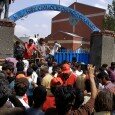By Irfan Bukhari –
All is not well at Pakistan’s state-run television broadcaster
Political interference, nepotism and mismanagement has corroded Pakistan’s state-run Pakistan Television Corporation, which was once viewed as an academy of learning for both artists and journalists.
Intrigue and corruption fill the air in PTV centres across the country. Almost every PTV official operates like a self-proclaimed boss, involved in petty rivalries, professional jealousy and conspiracy.
Every ruling political party has used PTV merely for propaganda mongering, compromising on standard and quality, which has crumbled the state-run TV in the face of stiff opposition posed by the proliferation of private TV stations.
Strong political or social connections can lead to lucrative job appointments at PTV. Academic certificates are rarely subjected to scrutiny; transparency is often amiss. Today, PTV is functioning in a free-for-all, according to several employees, who spoke on condition of anonymity. Staff hirings are almost random, promotions are mostly on whim and personal likings. Merit is sacrificed at the altar of personal preferences and political pressures.
Despite an ongoing ban on hiring at government organisations, people are being hired regularly at PTV, according to an official, who spoke on condition of anonymity. The official pointed out that most news anchors are hired arbitrarily by recommendation of political high ups. One talk show host was given the slot on the instructions from former President Zardari’s pir (spiritual leader), and another was taken on during elections, when former Acting Managing Director was not authorised to make new hires.
Disclosing information about how to get a job within the state-run broadcaster, another official explained that the Director of News has powers to employ translators on daily wages without taking approval from the higher authorities. “In this manner, people are employed initially on daily wages, before being absorbed as resource persons on contract. Then the journey towards regularisation begins,” the official said. A translator’s stipend varies from Rs.700 to 1400 a day.
Previous information ministers, including Sheikh Rashid Ahmed, Muhammad Ali Durrani, Firdous Ashiq Awan, and Qamar Zaman Kaira were responsible for the hiring of hundreds of PTV staff, according to PTV insiders, who spoke to Pique in several off-the-record interviews.
The PML-Q leadership had dozens of people recruited to the PTV Centre in Lahore in order to protect their political party’s interests. “We here at the Islamabad Centre face maximum pressure from the high-ups of PTV Lahore for airing news items regarding the Chaudhrys even today,” a PTV official said.
Firdous Ashiq Awan, the former minister of information under PPP rule, opened the now-defunct bureau in Sialkot and appointed more than 20 people from her constituency. Qamar Zaman Kaira, former information minister, hired a number of people on political refrences. Imran Mir as Chief Coordinator with a million-rupee salary, Saeed Minhas as Head of News, Tahir Malik as Chief Reporter, and Zafar Malik as Head of Content. The Supreme Court later terminated their employments when disgruntled PTV employees campaigned for an intervention.
The problem is not limited to new hires: promotions and transfers are also made on the basis of political influence and nepotism. “One joins the engineering, finance or marketing department, but after some time is re-designated as producer – a job whose criteria and qualification he does not meet,” said a PTV official.
In former information minister Sheikh Rashid’s words ‘the PTV has become overcrowded’. To a question on appointments on political references in the corporation, Rashid admitted that every government accommodated people in PTV. “It was also overcrowded during our days (Musharraf government) but when the PPP goes from power it leaves behind every organization more overcrowded,” he added.
THE TOP SLOT
The verdict by a judge of the Islamabad High Court, when it terminated Yousaf Baig Mirza’s contract in April 2013, gave a clear indication of how affairs are run at PTV:
“I am convinced that the appointment of the respondent (Yousaf Baig Mirza) is a result of a colourable exercise of authority, without due process, non-transparent approach, against the principles of healthy competition, fairness, openness, merit, offensive to the constitutional provisions and besides the dictums laid down by the Honourable Supreme Court of Pakistan.”
The verdict further directed the Ministry of Information “to commence a competitive process with proper advertisement” for the appointment of an MD for PTVC and asked that the hiring be done no later than May 10, 2013. Nine months later, the information ministry has failed to appoint an MD and PTV matters are being run ad hoc.
Yousaf Baig Mirza filed an intra court appeal against the April 2013 verdict and a two-member bench of the Islamabad High Court on 20December to set aside the previous verdict from a single-member bench. Mirza was not reinstated.
Talking to Pique, Arshad Khan, former PTV said: “First of all we will have come out of this fix that a journalist is needed to run the PTV or a management person. To run PTV, an organisation that has thousands of employees and dozens of departments, is not the job of a journalist or an anchorperson … all such experiments badly failed in the past … PTV needs a management person in the MD seat who can work in the environment of competition.”
Commenting on the core problem being faced by PTV, Agha Masood Shorish, Director of Current Affairs said: “In my opinion PTV could be revamped by appointing two to three MDs instead of one. One MD should oversee news and current affairs, the second MD will head programming while the third one will handle finance, administration, etc.”
Prominent anchorperson, Moeed Pirzada, who also served at PTV as Director World Affairs and Content Head English for two years, says that the administrative structure of PTV needed immediate change. “PTV should be run like BBC with an independent board … the board shall select the MD for three-year tenure post … the nominations for the top slot of state-run TV shall be cleared by the National Assembly and Senate Standing Committees on Information,” he proposed, saying the MD must have authority to execute revamping strategies.
AWAN’S CONTROVERSIAL RULE
Firdous Ashiq Awan’s days as Information Minister saw a massive exploitation of PTV resources by the minister for her personal and party interests, allege PTV officials.
A number of Awan’s political gatherings were declared PTV events and the costs were billed to PTV, according to officials at the state-run network.
Khanum Tayyba Bukhari, the spiritual guide of Ms. Awan, was provided a programme and paid a hefty salary under Awan’s patronage. Once, Khannum thrashed a makeup artist at PTV News, Islamabad, after she expressed dissatisfaction with the quality of her makeup. Soon afterward, Awan arrived and the employee was further abused by the minister.
The overwhelming influence of Bukhari on PTV employees started irritating professionals in PTV and some began raising their voices against it. Sarmad Salik, former Chief Editor of PTV News and Current Affairs, called Bukhari out and wrote an official letter to the then MD, Yousaf Baig Mirza. Salik later resigned from his position in protest.
FINANCIAL TROUBLES
PTV Sports has been a valuable source of income for the corporation but its advertising revenue has declined and viewers have migrated to other channels. In 2013, the syndication committee did not bid to air cricket matches and consequently faced huge financial losses during the Champions Trophy and the series against West Indies.
“The former acting MD fired the director of sales at the time when the series started… Not bidding for South Africa and Sri Lanka not only inflicted monetary losses on PTV, but also deprived viewers of PTV Sports a chance to enjoy cricket,” a source claimed. PTV World, PTV’s English-language channel, was launched in 2013 at the request of former President Asif Ali Zardari.
Sources in the corporation claim that most staff was hired on recommendations from PPP ministers and lawmakers, and particularly according to the desires of Zardari House. Despite proper advertisement, only well-connected applicants were hired. PTV World has put an extra burden on the organisation: it harbours a monthly budget of Rs.100 million and earns nothing through advertising. In the first half of 2013, revenue was down to Rs.500 million from the previous year.
A former PTV official told Pique that PTV used to pay bills of all functions arranged by the President or Prime Minister’s house, despite its poor financial health during previous PPP government. PTV’s outstanding bills with various advertising agencies and clients are continuously mounting, according to a PTV official.
“Sometimes recoveries are not made from different clients due to political pressures and influences, and most of the time PTV’s business and marketing officials deliberately leave lacunas in business agreements with clients so that they could go into litigation to avoid paying PTV dues. In exchange, these officials take their share,” the official alleged.
ACCUSATIONS OF MISCONDUCT
In May 2010, the Head of Current Affairs at PTV Islamabad, Tahir Mahmood, was accused of harassing one of his female colleagues, Zar Nigar Ali. Mahmood reportedly threatened Ms. Ali with dire consequences if she did not fulfil his desires. In her statement given to the MD, she claimed that she was annoyed by Mahmood’s continuous remarks, lecherous looks, and unwanted telephone calls, sometimes late at night.
After receiving the statement, a three-member inquiry committee was asked to verify the charges levelled by the producer. No report has so far been made public.
In 2004, Akhtar Waqar Azeem announced that PTV would soon launch a Direct-to-Home (DTH) service with an array of 50 channels. He said that DTH channels would commence broadcasting within six months, especially in areas where cable was not available. DTH service providers collect TV programmes from different sources (satellite news, entertainment, and sports programmes) and combine them to make a package, which is then transmitted via satellite link. When the government decided to invite bids from the open market – for which two private TV channels showed interest – PTV management started opposing the project, fearing that its launch would damage the PTV terrestrial monopoly. The DHT project has never materialised.
Despite having the largest infrastructure and a bigger workforce than any other private TV channel in the country, PTV has virtually failed to face the challenge of private electronic media houses. “Editorial independence is needed to beat competitors. PTV has fewer DSNGs than rival channels. Our engineering department does not allow us procuring small DSNGs, therefore our news coverage capability is compromised,” lamented a former top PTV official.
The official also noted that those professionals who were hired from the open market to revamp news and current affairs presentation were not allowed to work independently by politically appointed officials. “PTV is fast losing its viewership and consequently advertisement revenue,” the former official added.
“Nothing is going in the right direction at PTV,” said Senator Kamil Ali Agha, Chairman of the Senate Standing Committee on Information. Mr. Agha claimed that anchors were being sacked on charges of inviting guests from the opposition. Agha said that PTV’s financial health was so bleak that it was unable to pay its anchor. “Tariq Aziz’s dues have not been cleared for many months. Even pensions and medical bills are not being paid on time,” Agha added, referring to the famous host of Neelam Ghar show.
Mr. Agha also claimed that PTV suffered major losses by not bidding for cricket rights, which happened to due to the PTV management’s connivance with a private sports channel. Agha said he plans to convene a special senate standing committee meeting on PTV license fee issues since he believes that the public is not receiving a service for the fee it is paying.






























































































